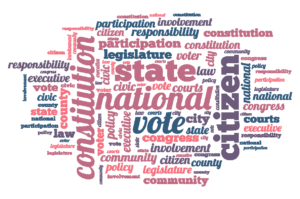Resources for Educators
Classroom-based Assessment (CBA)
The Kansas Social Studies Classroom-Based Assessment (CBA) is designed to measure student understanding of the five History, Government, and Social Studies (HGSS) standards and four associated benchmarks that support the discipline-specific application of content in authentic situations. The standards, benchmarks, and skills allow Kansas school districts, classroom teachers, and students the opportunity to develop their own assessment that best supports local decisions concerning content, sources, and products. To prepare learners for the state-level CBA, the KOHP has developed several compelling questions, frameworks, a multi-disciplinary crosswalk, and instructional activities for use by classroom teachers.
Civic Engagement
Civic engagement exists as part of the current KSDE Kansas Education Systems of Accreditation (KESA) foundational structures, thus all systems need to address civic engagement in a variety of ways. School systems also have the option to apply for Civic Advocacy Network (CAN) recognition awards based on evidence of civic engagement. The KOHP can help in both these areas. Civic Engagement involves both learning in the classroom and service projects in the community. Given that part of civic engagement is educational, the KOHP can be an important tool to teach about different areas of state and local government for a variety of grade levels. KOHP has created lesson plans for student-led oral histories of local officials that engage the community. Further, high school students can utilize the KOHP to teach younger students about civic engagement, which itself is a part of civic engagement, an important aspect of CAN requirements.
Geography
Geography generally helps students understand the world in spatial terms with maps, tools and technologies. It also describes the physical and human characteristics of places as well as how culture and experience influence people’s perceptions of places and regions. The KOHP Oral History Collections on Water and Energy offer good examples of how policymakers have dealt with environmental concerns.
Government
Government uses portions of oral history interviews and sample Compelling Questions to examine how the three branches of government work, how public policy in a variety of areas is made by governmental bodies. The role of leadership by elected and appointed officials to effect compromise on controversial issues is illuminated.
History
History is necessary for making sense of the present. We need it for identity, as a way of understanding our personal past, to understand how we are connected to each other, and what our ancestors experienced. Nations use history as the basis for law and government. History is a record of the written word, telling us what was recorded on a given day but not why, or how. Oral history fills in the gaps by focusing attention on people’s memories and lived experiences. History is part of the larger package of social studies needed for active civic engagement.





